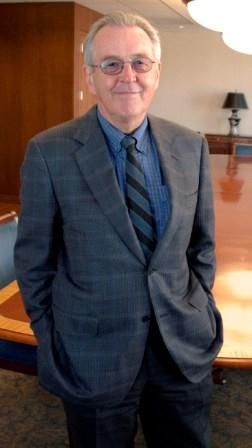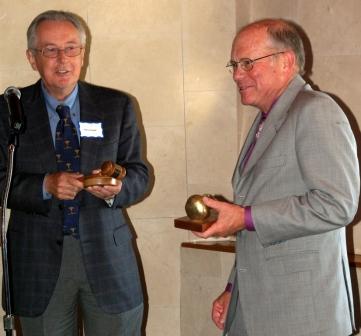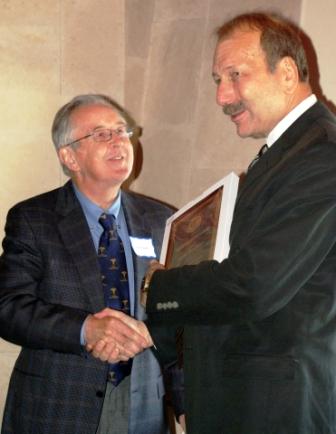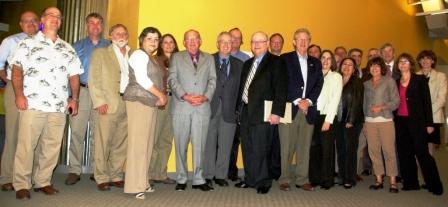August 2010

NOTES FROM THE ACADEMIC SENATE CHAIR
HENRY POWELL
Dear colleagues,
When I took over as systemwide Academic Council chair on September 1 of last year, I wanted to ensure that as the Senate conducted its work this year, the faculty would draw inspiration from the 50th anniversary of the California Master Plan for Higher Education. I felt strongly that 2009-10 was a great opportunity for the Senate – and the University – to consider whether the Master Plan is still viable in the midst of California’s mounting fiscal crisis.
This anniversary also inspired state Assembly member Ira Ruskin to convene a Joint Committee on the Master Plan, which provoked a discussion among the faculty of UC, the California State University, and the California Community Colleges along with a joint effort to lobby legislators about the importance of higher education funding to the state.
The segments agreed that although the Master Plan is “broke” because of the state funding situation, it is not fundamentally flawed; and indeed, it is more relevant than ever. For the University of California, the Master Plan still ensures our role as a system of ten universities where undergraduate teaching is enriched by the research environment, where graduate programs are supported by the high success of faculty in obtaining extramural funding, and where graduate and professional schools occupy a prominent position. The Master Plan is something to celebrate and to fight for.
This is a very difficult time in the history of the University of California, and I believe the present funding situation is the single greatest threat to higher education in the state. It is absolutely critical that we foster a robust and supportive partnership with the other segments of higher education to make this case. In that respect, I think we have had a good year. It is a difficult step for faculty to join in an advocacy effort, but the sheer sense of emergency pushes me to recommend this course of action to my colleagues. I hope that you will join me in ongoing advocacy efforts.
The UC Commission on the Future endeavored this year to explore how UC can continue to serve California and maintain quality, access, and affordability in a time of unprecedented fiscal constraint and diminishing State resources. While the Commission did not succeed in meeting all its goals, it did engage some of the most creative minds of the Senate. The Commission will continue to meet at least through the end of 2010, but the President has told the working groups that they do not need to continue their labors. Consequently, the Academic Council has agreed to convene a Special Senate Committee on the Future of the University of California, which will to build on the insights they developed in the working groups to make specific recommendations about the issues shaping UC. I will chair the group, and its roster will consist primarily of faculty members who served on the Commission Working Groups. The goal is to make their experience and input available to the incoming members of the Academic Council, who will also have the opportunity to review the thoughtful feedback on all Commission proposals that the Senate’s divisions and standing committees provided this spring and summer. Our plan is to meet in the early fall and consider and synthesize the most productive recommendations and new ideas that for presentation to Council in November, the Assembly in December, followed by a normal review by the standing committees and divisions in early 2011.
 |
| Chair Powell passes the gavel to incoming Chair Dan Simmons at the July 2010 Council dinner |
One of my most memorable moments of the last two years was listening to Grace Amemiya’s extraordinary presentation at the July 2009 Regents meeting, where she described how her passion to study nursing at Berkeley was thwarted when she and other people of Japanese ancestry were sent to relocation camps by military orders issued during World War II. Due to substantial efforts by Senate and staff colleagues in UCOP and on the campuses, with special contributions by Senate Vice Chair Dan Simmons and Vice President Judy Sakaki, the Regents authorized honorary degrees for these students. At the Berkeley graduation ceremony for the former internees, one recipient recalled how she taught children in those camps about the US Constitution while armed guards outside “protected” the United States from her. It was powerful to witness those remarks and the process of restorative justice. I was powerfully moved when I heard that Grace’s loyalty to Berkeley and UC remained despite these circumstances, and how at age 88 she appreciated the steps taken by UC to rectify this wrong by awarding honorary degrees to her and other former internees.
Another illuminating moment occurred at a meeting of the Intersegmental Coordinating Committee that I attend as chair of the Intersegmental Committee of Academic Senates. Dr. Jonathan Brown, who represents the Association of Independent California Colleges and Universities, noted that products like the iPhone are the outcome of research creativity in the state of California, but that the public doesn’t necessarily make the connection between an investment in intellectual discovery and the economic return to the state. For me, it was a powerful reminder that what our research universities do is critical to the California economy and the public good.
Other special moments came in Fresno and Merced. I accompanied President Yudof to Fresno’s Sunnyside High School, where he announced the launch of a billion dollar scholarship campaign to help UC compete with private universities and retain the finest California students consistent with our Master Plan obligation. We learned that all but 20 of the 3000 students in that extraordinarily diverse school would quality for financial aid under the Blue and Gold program. That brought home to me UC’s great need to preserve the access and affordability parts of our mission. In Merced, I attended the first commencement ceremony, where I was particularly affected by the speech of the valedictorian who is now a medical student at UCSF and who intends to return to the Central Valley to practice.
Dan and I visited each of the campuses twice this year; first to fulfill a commitment we made to Council to visit each Senate division to hear directly from faculty about a range of issues, and second, to brief faculty about the challenges facing the UC Retirement Program and potential changes to post-employment benefits. These visits strengthened our view of the Senate as a single body. I like to see the Senate as an organized conversation that can help keep shared governance alive and healthy.
Over the past few months Dan and I have worked on the President’s Task Force on Post-Employment Benefits with a special group of faculty who have had an enormous role in guiding this process. The PEB Steering Committee report has been sent to the President and should be released for broader review sometime between now and early fall. The final decision about a possible pension redesign will not come before December, giving faculty time to discuss, review, and comment on the proposal through the normal Senate review process. I believe the president is committed to doing the right thing for UC, but we must all recognize that this will mean more pain for everybody, since resuming contributions after a 20-year holiday could be considered a de facto pay cut. I am excited that Robert Anderson will join Dan Simmons as vice chair in 2010-11. Bob is the Senate’s most highly respected expert on benefits and retirement.
 |
| George Blumenthal receives the 2010 Oliver Johnson Award. |
Despite its problems, the UCRP is a well-managed pension plan that delivers higher yield than many private investments without levying fees on employees. UC’s benefits have been key to our ability to recruit and retain a world class faculty and thus to our excellence. I worry about the fierce attacks on public pensions in the popular press and believe that a timely rethink of our own pension policy will be interpreted as a commitment by UC to get its own house in order. I regret that we did not start contributions years ago, but I think the Senate, by contributing to the process, and the University, by managing the process, are doing good things in a timely way. That said, the erosion of pensions in the private sector is socially destructive. Pension programs, starting with Social Security, but also UC’s post-employment benefits, are vital sustaining programs for the middle class and are also deferred compensation to which employees have a vested legal and moral right.
Based on my experience over the last two years, I feel that President Yudof has an excellent understanding of and respect for the process of shared governance, which he has assiduously supported despite occasional disagreements. We must hold the administration to this commitment. Online education is an example of a controversial issue that must involve faculty. It is true that the culture of teaching and the delivery of curricular content is being changed by available and emerging technologies. Discussions about online education and the pilot project should continue with an emphasis on identifying and replicating the most effective faculty- developed initiatives from the campuses. Regardless of whether the pilot project goes forward, the administration should work with faculty and departments that have innovative and successful programs. I think the best initiatives are going to be those developed by individual faculty who have a passion for teaching and innovative methodology in teaching.
For me it has been the highest privilege and honor of a lifetime to serve as the chair of the UC systemwide Senate. I am appreciative that the best and most committed faculty continue to be so generous with their time in service to the Senate even through difficult fiscal times with furloughs and budget cuts. I particularly appreciate the work done on systemwide committees where a very high level of faculty expertise develops policy for the institution to keep it vibrant during very difficult times.
The present fiscal crisis is grave but by no means the first to hit UC. There were other crises in the past and UC came out of all of them stronger than before. I think the public need for a great UC is so strong that it demands consistent pressure from all employees on the legislature and the public to preserve this institution as one of very high quality with enhanced access and sustained affordability. That is the thing I would most like to see happen.
Fiat Lux, Harry
 |
| Members of the 2009-10 Academic Council pose with President Yudof. |
